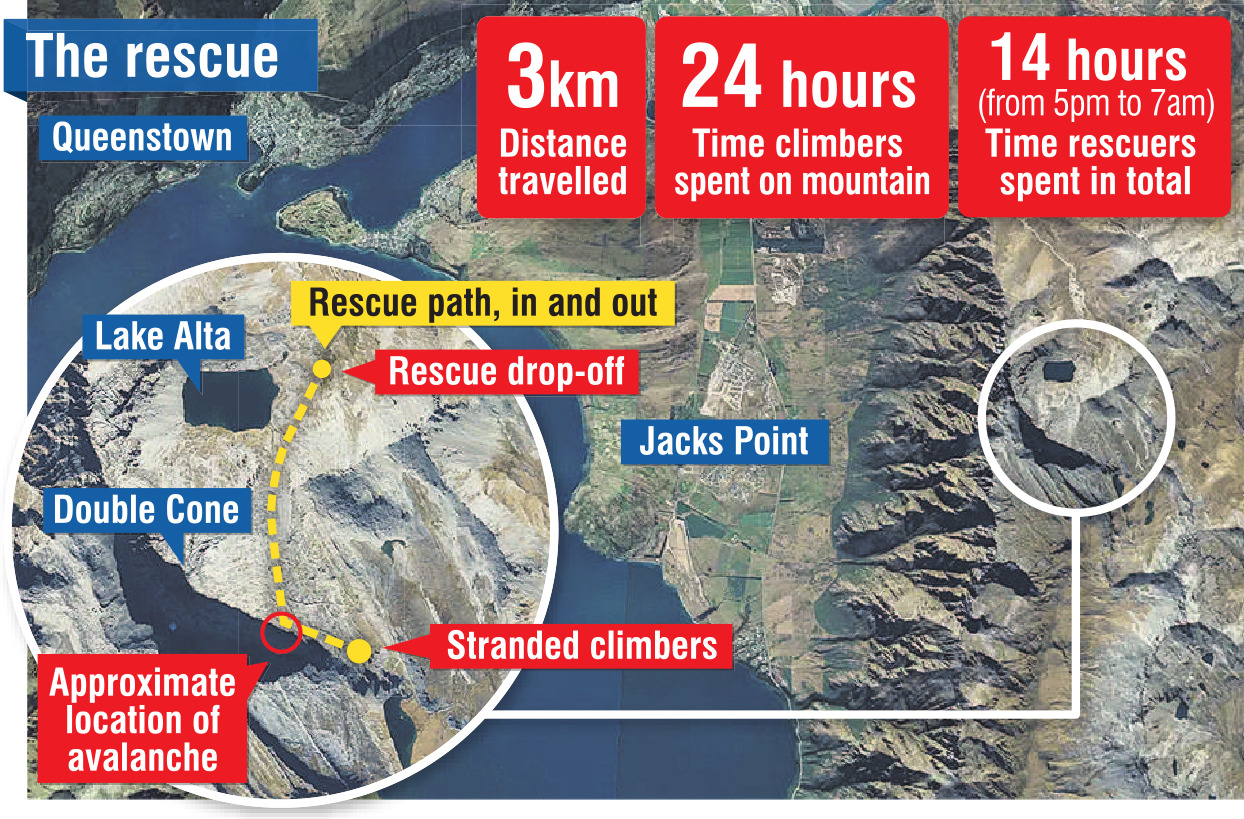
The rescue mission, involving members of Queenstown police Search and Rescue and the Queenstown Alpine Cliff Rescue (ACR) team, took 14 hours in all, with four members of the latter eventually reaching the two men, one from Scotland and the other from France, just after 4.30am on Sunday.
Queenstown ACR team co-ordinator Russ Tilsley said the pair initially set off from Wānaka at 5am on Saturday, reaching the Remarkables about 7am.
They had planned to go into the lower Wye, but instead climbed up the south face of the Remarkables, and "wrapped it off", by which point it was getting late.
Mr Tilsley said they tried to climb up a well-known access gully, but set off a small avalanche.
A forecasted weather front arrived sooner than they expected, so they were "a bit rushed" while attempting another route and became disorientated.
They then decided to stop and call for help.
"Then the weather came in and that was it — it was game, set and match for them, really," Mr Tilsley said.
Fortunately, the men, in their mid-20s, both had cellphones and coverage, but little else to help them.
Neither carried a personal locator beacon, or an inReach device which enables messages to be sent to emergency services via satellite.
They also did not have a first aid kit, any extra warm clothes or food, a bivvy bag, transceivers, probes or shovels.
Constable Pepper Ruston, of the Otago Lakes District police Search and Rescue, said the pair took cover in a rock bivvy, but were not well-placed to spend the night on the mountain, having just one silver rescue blanket between them.
Police received the initial call for help just after 5pm on Saturday, by which time conditions on the mountain were deteriorating.

Both attempts were called off because of high winds and whiteout conditions.
While unsighted, the climbers stayed in cellphone contact with rescue co-ordinators while rescue teams decided to send a four-person ACR team in on foot.
Mr Tilsley said the decision to send a rescue team in on foot was not taken lightly.
They set out from the top of the ski lift, towards Lake Alta, just after midnight in blizzard conditions, where the temperature was -8degC and wind was gusting to about 130kmh.
"Considering the conditions, the avalanche danger was high.
"It was a blizzard and having to go on foot — we don’t usually walk that far, we usually go in by helicopter — so it was [fairly treacherous]," Mr Tilsley said.
Const Ruston said by 2.20am the team was within a few hundred metres of the climbers, but was having to move "very cautiously" due to avalanche risk.
The climbers were located just after 4.30am and helped by rescuers to walk the 3km back to the skifield.
All six were transported back to the SAR base, arriving at 7am.
"The climbers were assessed and found to be medically fit — albeit cold, tired and embarrassed," Const Ruston said.
While they had researched conditions before leaving, they were caught by the rapid change in weather and had not checked the avalanche risk, she said.
Mr Tilsley recommended doing "thorough research" before heading into the back country.










